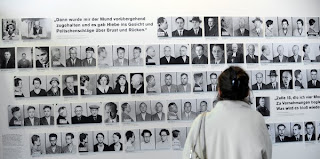Germany and Globalization Five Key Trends
1. Germany is the only large European country that continues to maintain a strong and persistent presence in high- and medium-high-technology manufacturing. German industry accounts for 87% of Germany’s trade. German economic strength resides less in pure technical wizardry than in the capacity to integrate cutting-edge innovation into “classical” manufacturing products and processes, often rendering medium-tech industries into high-tech leaders. This is particularly evident in machine tool and auto production, chemicals and electronics engineering. Intelligent production processes are thus a key basis for German prosperity. Germany’s strength is not only due to household name large companies but to the dynamism of its Mittelstand of world-leading smaller firms. The test is whether Germany can keep ahead of the game through continuous process and production innovation in industries coming under greater direct pressure from rapidly developing countries as well as high-tech developed countries.
2. Germany’s trade has shifted to developing countries, but German investment remains focused
overwhelmingly on developed countries. Nine of the ten fastest growing export markets for Germany since 1990 have been developing nations. German exports to the latter increased by nearly 10% annually since 1990, versus a comparable rate of 5.8% to non-EU-15 developed nations. More than two-thirds of Germany’s outwards investment stock, however, is in developed nations.
3. German companies are often front-runners in both Europeanization and globalization. They are taking advantage of the larger European Single Market to integrate new EU member states into their manufacturing production processes. 87% of German offshored jobs stay in Europe. Germany is offshoring manufacturing jobs within Europe and services jobs to Asia. The investment of German companies in the initial ten central and east European accession countries to the EU rose from €350 million in 1990 to €41.4 billion in 2004, and the number of people in these countries employed by German companies during this period jumped 25 times – from 31,000 in 1990 to 757,000 in 2004. Europeanization has its limits, however – in reaction to the 2008 global financial crisis German leaders refused to participate in any Europe-wide plan that would potentially draw on German taxpayer funds to rescue banks in neighboring countries. Despite the euro, the EU’s financial sector is still more fragmented than united. This is inefficient and makes it hard for Europe to craft a coordinated and
effective response in times of crisis.
4. Germany is shrinking, aging, and losing ground in the battle for global talent. Every year 300,000 fewer children are being born than needed to keep Germany’s population stable. An older German work force is exacerbating skill shortages and exposing mismatches between available jobs and relevant skills. Globalization is not responsible for these demographic pressures, but it exposes the demographic challenges starkly. Immigration is essential to Germany’s future prosperity, and Germany remains a top destination for migrants. But Germany is a magnet for the unskilled and recent efforts to facilitate the inflow of skilled migrants have yet to demonstrate success. Domestic reforms and new approaches are urgently needed.
5. Despite key strengths, German innovation is uneven and its education system is failing to meet the challenge. Germany ranks high in key cutting-edge economic sectors, boasts vibrant regional clusters, and invests considerably in innovation at home and abroad. Yet Germany ranks 8th among 16 advanced innovation economies and risks being squeezed between the high technology challenge posed by the U.S. and Japan and the catch-up challenge posed by rapidly developing countries.
Hamilton, D, & Quinlan, J. (2008). Globalization & Europe: prospering in the new whirled order. Washington, DC: Center for Transatlantic Relations.






